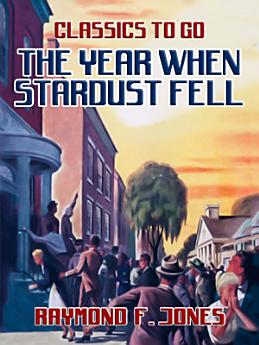The Year When Stardust Fell
Mar 2020 · Otbebookpublishing
Ebook
140
Pages
family_home
Eligible
info
reportRatings and reviews aren’t verified Learn More
About this ebook
A MYSTERIOUS "FALL-OUT" PARALYZES CIVILIZATION! Mayfield was the typical college town. Nothing too unusual ever happened there until a mysterious comet was suddenly observed by the scientists on College Hill. The copper-yellow glow of the comet seemed to have brought the whole world to a grinding halt. Here is science fiction at its thrilling best.(Goodreads)
About the author
Raymond F. Jones (1915-1994) was an American science fiction author whose works captivated readers during the mid-20th century, a period marked by rapid technological advancements and Cold War anxieties. Born in Salt Lake City, Utah, Jones initially pursued a career in engineering, a background that infused his writing with a distinctive blend of technical precision and imaginative speculation.Jones is perhaps best known for his novel "This Island Earth" (1952), which was later adapted into a cult classic film in 1955. The story's exploration of interstellar communication and advanced technology resonated deeply with a generation fascinated by the possibilities of space exploration and the burgeoning field of electronics.A prolific contributor to pulp magazines, Jones's stories often grappled with themes of human ingenuity, ethical dilemmas in scientific progress, and the potential perils of unchecked technological power. His work reflected the era's optimism and anxieties about the future, making him a significant voice in the Golden Age of Science Fiction.Despite his contributions, Jones's career was not without controversy. His outspoken views on the commercialization of science fiction and the genre's evolving landscape sometimes put him at odds with contemporaries and publishers. Nevertheless, his influence is evident in the works of later science fiction writers who similarly blend scientific rigor with speculative storytelling.Jones's legacy endures as a testament to the power of science fiction to challenge, inspire, and provoke thought about humanity's place in the cosmos. His stories continue to be a source of fascination for modern readers, offering a window into the hopes and fears of a bygone era while remaining eerily relevant today.
Rate this ebook
Tell us what you think.
Reading information
Smartphones and tablets
Install the Google Play Books app for Android and iPad/iPhone. It syncs automatically with your account and allows you to read online or offline wherever you are.
Laptops and computers
You can listen to audiobooks purchased on Google Play using your computer's web browser.
eReaders and other devices
To read on e-ink devices like Kobo eReaders, you'll need to download a file and transfer it to your device. Follow the detailed Help Center instructions to transfer the files to supported eReaders.








